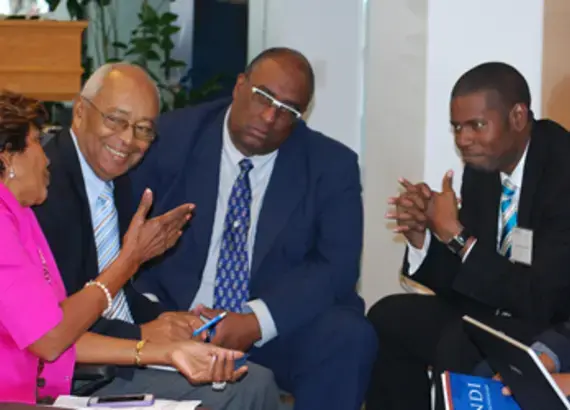
Success Story
International Network Shares Techniques for Organizing Candidate Debates
“We fought a senseless war for 11 years…we destroyed every piece of our society. If we had the culture of debate we would not have to war; people would not have lost their lives...”
- James Williams of Sierra Leone, discussing the benefit of debates to prevent conflict and strengthen democracy
Williams, secretary general of Sierra Leone’s Guild of Newspaper Editors, was one of 27 participants from 18 countries who gathered in Washington, D.C., for three days recently to discuss methods and challenges involved in organizing political debates. It was the third meeting since 2009 for a growing international network of debate practitioners brought together by NDI and the Commission on Presidential Debates (CPD), the nonpartisan, nonprofit organization that has produced and sponsored all U.S. general election debates since 1987.
While candidate debates have become an accepted and expected part of elections in many parts of the world, they are not the norm in emerging and transitional democracies, where there is less tradition of candidates facing each other; contrasting their positions on issues rather than personality, ethnicity or religion; and being held accountable to voters.
As debate expertise has grown among the expanding membership of the international network, an important component of its gatherings has been the interaction among the participants to share lessons and techniques.
The Washington meeting, which took place June 16-19, was opened by CPD Co-Chairman Mike McCurry. It was devoted to presentations from each of the participating countries about their debate experiences, including the political context that led to their interest in debates as well as the day to day challenges they face. These included mid-debate power outages, encouraging reluctant incumbent and opposition candidates to take part, and pulling together a parliamentary elections debate with just a few weeks notice.
Later panels focused on the fundamentals of organizing a debate, producing a live debate broadcast for TV and radio, and the role of debate moderators, among other subjects. Experienced moderators of U.S. presidential debates – Bob Schieffer, chief Washington correspondent forCBS News who has chaired three debates, and Jim Lehrer of the PBS NewsHour, the “dean” of debate moderators who has presided over 12 face-offs going back to 1988 – offered the group practical insights into handling high-stakes debates with tens of millions of viewers.
Lehrer said the role of moderator was the most difficult job he has tackled in his 54-year journalism career. He highlighted the importance of ensuring that debates remain focused on candidates and not become a showcase for the moderator. Schieffer noted that the key to success was preparation, which he likened to “going back to graduate school.”
Later symposium discussions focused on new trends, including the increasing popularity of post-election debates, where citizens hold office holders and their political opponents to account 100-days into their terms by asking how well they have carried out campaign promises. This approach has been used in Colombia, Guatemala and Serbia.
Other topics included engaging youth in policy debates through social media as has been done in Tunisia, and participation by Afghanis in national and international debating competitions. Participants also discussed a new Argentine law in Chaco province requiring candidates to debate or face sanctions, such as the loss of public campaign funds. Jamaican representatives discussed using polling to quantify the impact of debates by tracking how many people tuned in, what they learned about candidates’ positions and whether voters changed their minds as a result.
The first debate conference in 2009 included representatives from 11 countries. Last October, 12 nations were represented at a program at Hofstra University, where attendees witnessed firsthand the intricacies of organizing the second 2012 U.S. town hall-style presidential debate. This year, participants came from Afghanistan, Argentina, Colombia, Ghana, Guatemala, Guyana, Haiti, Jamaica, Kenya, Moldova, Nigeria, Paraguay, Peru, Serbia, Sierra Leone, Trinidad and Tobago, Tunisia, and the United States.
The benefits of continuing to exchange information have led the group to create a soon to be available website, where visitors will be able to find information on debate best practices, including organizing guides and checklists, set designs from around the world, comparative formats and rules, tools for negotiating with candidates and the media, ethical guidelines for members of a debate sponsoring organization, and voter education materials, among other topics.
Participants also plan to stay in touch through social media and regional networks. The Caribbean participants signed a memorandum of cooperation, and attendees from the African continent are planning to meet in Abuja, Nigeria's capital, to discuss regional collaboration. Latin American groups are collecting comparative information on debates held in their region.
Throughout the days’ discussions, participants noted both the similarities and differences in the challenges they face in organizing debates. But many agreed with the sentiment expressed by Ransford Van Gyampo of the Institute of Economic Affairs, a leading debate sponsoring group from Ghana, who said that debates have moved his country’s elections “from the politics of insults to the politics of issues.”
Read more:
Published July 10, 2013
